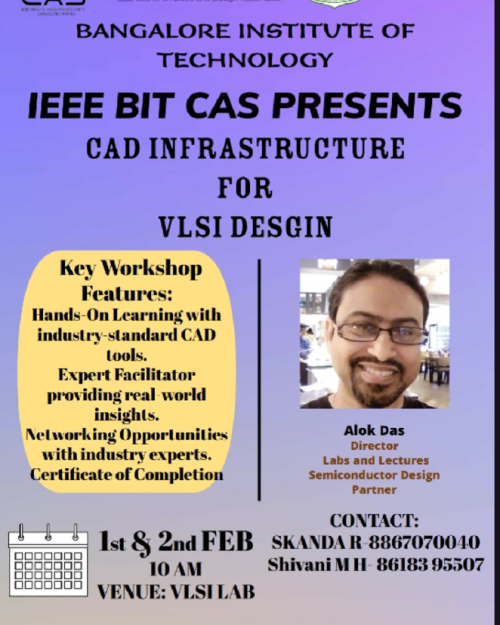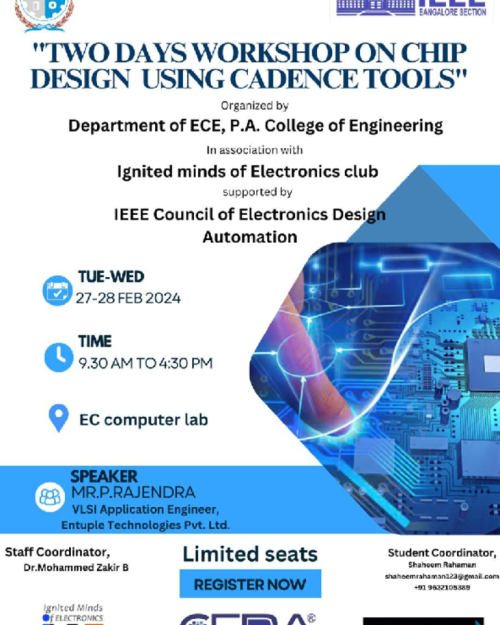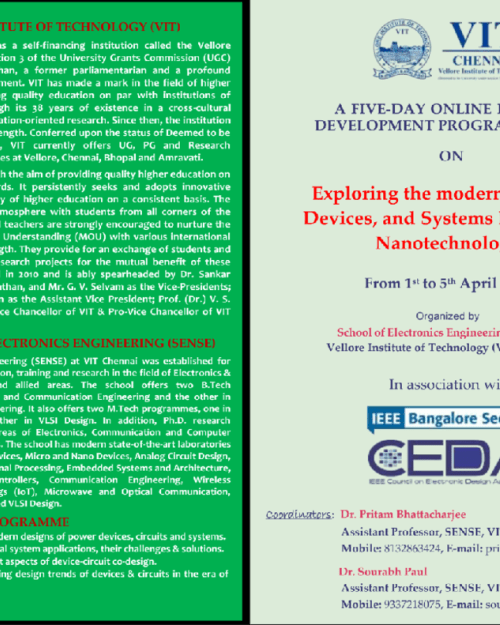CEDA Bangalore Chapter Events
UPCOMING EVENTS
IEEE Symposium-cum Workshop on Emerging AI/ML Trends (SWEAT 2024)
Jun 28 2024
Organizer: IEEE Bangalore Section
The Symposium-Workshop on Emerging AI/ML Trends (SWEAT-2024) aims to explore and discuss the latest developments and applications in the fields of Artificial Intelligence (AI) and Machine Learning (ML). This event will provide a platform for researchers, industry professionals, and academics to exchange ideas, share insights, and foster collaborations. Participants can expect engaging presentations, interactive discussions, and hands-on workshops that delve into cutting-edge technologies and their real-world impact. The SWEAT serves as a valuable opportunity to stay abreast of the rapidly evolving landscape of AI and ML, ultimately advancing knowledge and innovation in these transformative fields.
Understanding Explainable AI (XAI)
Explainable AI refers to the design and development of AI models and algorithms that can be understood and interpreted by humans. XAI aims to make AI systems transparent, providing insights into how decisions are made and why specific outcomes are predicted. This transparency fosters trust, enables accountability, and facilitates collaboration between AI systems and human users.
Understanding High-Bandwidth Memory (HBM)
High-Bandwidth Memory (HBM) is a type of memory architecture that enables faster data transfer rates between the GPU (Graphics Processing Unit) or other processors and memory chips. Unlike conventional DDR (Double Data Rate) memory, HBM stacks multiple layers of DRAM (Dynamic Random Access Memory) vertically on a single substrate, connected by through-silicon vias (TSVs). This unique design minimizes latency and maximizes data bandwidth, making it ideal for data-intensive tasks like AI, machine learning, and graphics rendering.
Understanding Quantum Computing
Traditional computers use binary bits (0s and 1s) as the basic unit of information. Quantum computing, onthe other hand, leverages quantum bits or qubits, which can exist in multiple states simultaneously due to the phenomena of superposition and entanglement. This unique property allows quantum computers to perform complex calculations in parallel, making them exceptionally powerful for certain types of problems.
Understanding In-Memory Computing
In-memory computing refers to a computing paradigm where data is stored and processed primarily in the main memory (RAM) of servers, rather than being fetched from disk storage like traditional databases. This architecture allows for significantly faster data access and retrieval times since data resides in a volatile, high-speed memory rather than on slower disk drives.
We are looking for sponsors for the symposium.
Gold (INR 50,000/-)
Keynote Slot
6’x3’ Booth Space
Branding
10 Free registrations
Silver (INR 30,000/-)
6’x3’ Booth Space
Branding
5 Free registrations
Bronze (INR. 15,000/-)
Branding
5 Free registrations
Registration: https://web.ticketdude.app/e/62

PAST EVENTS
CAD infrastructure for VLSI design
1-2 February 2024
Two-day symposium was conducted by Bangalore Institute of Technology, Bangalore. In this symposium CEDA explained the hardware and software needed for chip design and manufacturing. With the help of the experts the students were able to install and configure Linux in the computers in the electronics lab. Later they installed the OpenLane suits of tool for RTL to GDS creation. This a chain of open-source EDA tools. At the end they tried one small design and was able to create GDS.
Organizer: Dr. Jalaja S (Click to show email)
Tech-Talk on Open-Source Tools in Chip Design
16 February 2024
One-day seminar was conducted by Malnad College of Engineering, Hassan, India. Hassan is a place which comes under Mysore Subsection of Bangalore. CEDA introduced the open-source tools that are available today. Also explained how they can be used to manufacture chips. The college invited few other colleges nearby. Almost hundred students and faculties attended the seminar. Malnad College showed interest to sign MoU with CEDA also.
Organizer: Chapter Chair, Aloke Das (Click to show email)
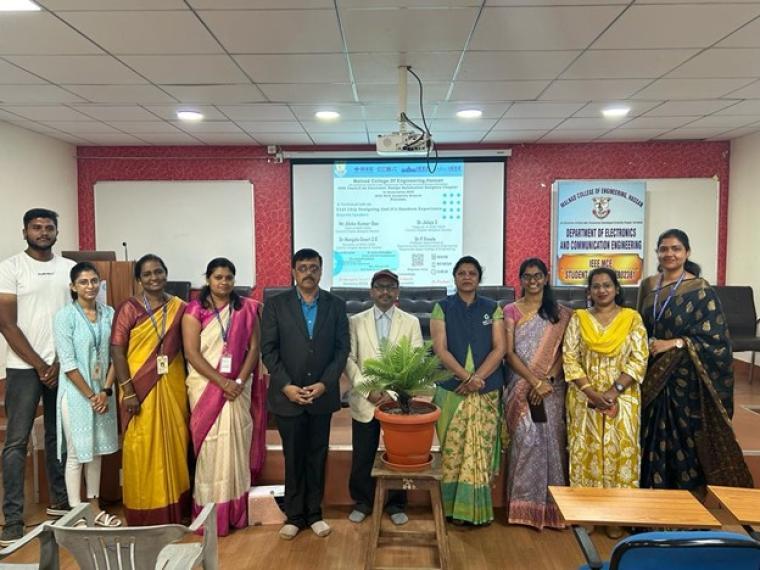
CHIP Design Using Cadence Tools
27-28 February 2024
Two-day workshop was conducted by the CEDA student branch of P A College of Engineering, Mangalore, India. Mangalore is a subsection of Bangalore. Dr. Mohammed Zakir has conducted this event in collaboration with Entuple Technogies. They are the distributor of Cadence tools. The UG and PG students were trained on Cadence tools to perform RTL to GDS flow.
Organizer: Dr. Mohammed Zakir B (Click to show email)

Five-day Online Faculty Development Programme (FDP)
1-5 April 2024
This was an online faculty development program. It was organized by Vellore Institute of Technology, Chennai. CEDA Bangalore was technical partner for this. Dr. Sarfraz Hussain, as part of CEDA delivered a talk on recent topics.
Organizer: Dr. Sarfraz Hussain (Click to show email)
MoU and Workshop in EDA tools
7-9 May 2024
An Mou has signed between CEDA Bangalore and Vemana Institute of Technology, Bangalore. A three-day workshop was conducted on Verilog language and Spice language. Design of analog and digital circuits were demonstrated using open-source tools in the electronics and communication lab. CEDA shall collaborate with the undergraduate students to manufacture a chip.
Organizer: Chapter Chair, Aloke Das (Click to show email)
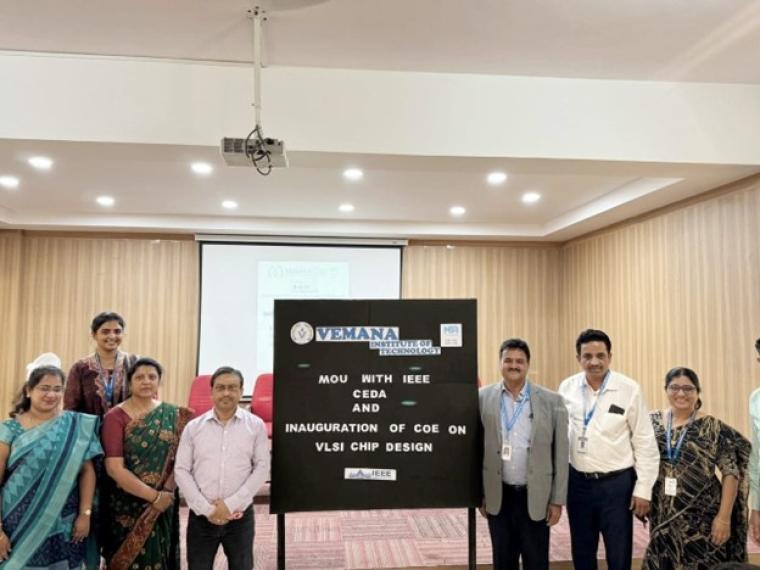
Workshop on Open-Source EDA Tools
23-24 May 2024
Event or Conference DescriptionAn MoU was signed between IEEE CEDA Bangalore and VIT, Chennai to collaborate in semiconductor technology. CEDA conducted a two-day workshop on analog and digital design using open-source EDA tools in Vellore Institute of Technology, Chennai. This was an offline event at their Tambaram campus. Dr. Sarfraz Hussain conducted the analog part. Mr. Aloke Kumar Das conducted digital part. Mr. Girish Subbarao conducted embedded system overview. Total thirty faculties attended the workshop.
Organizer: Chapter Chair, Aloke Das (Click to show email)




